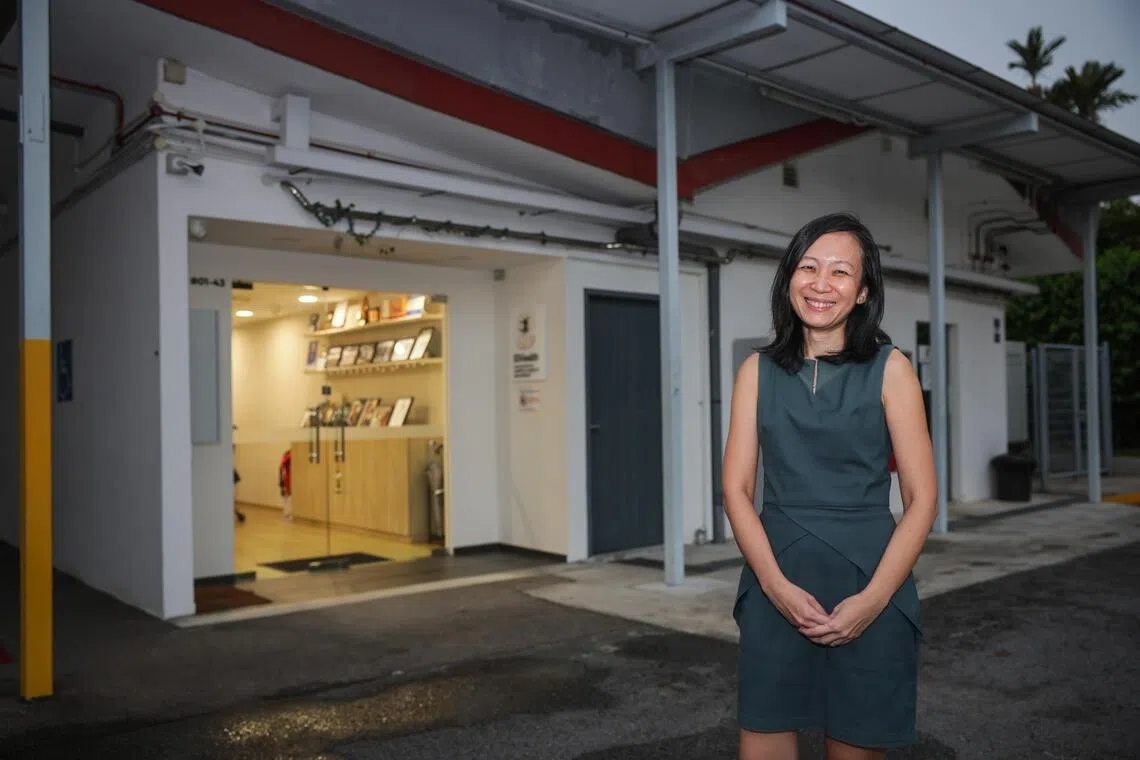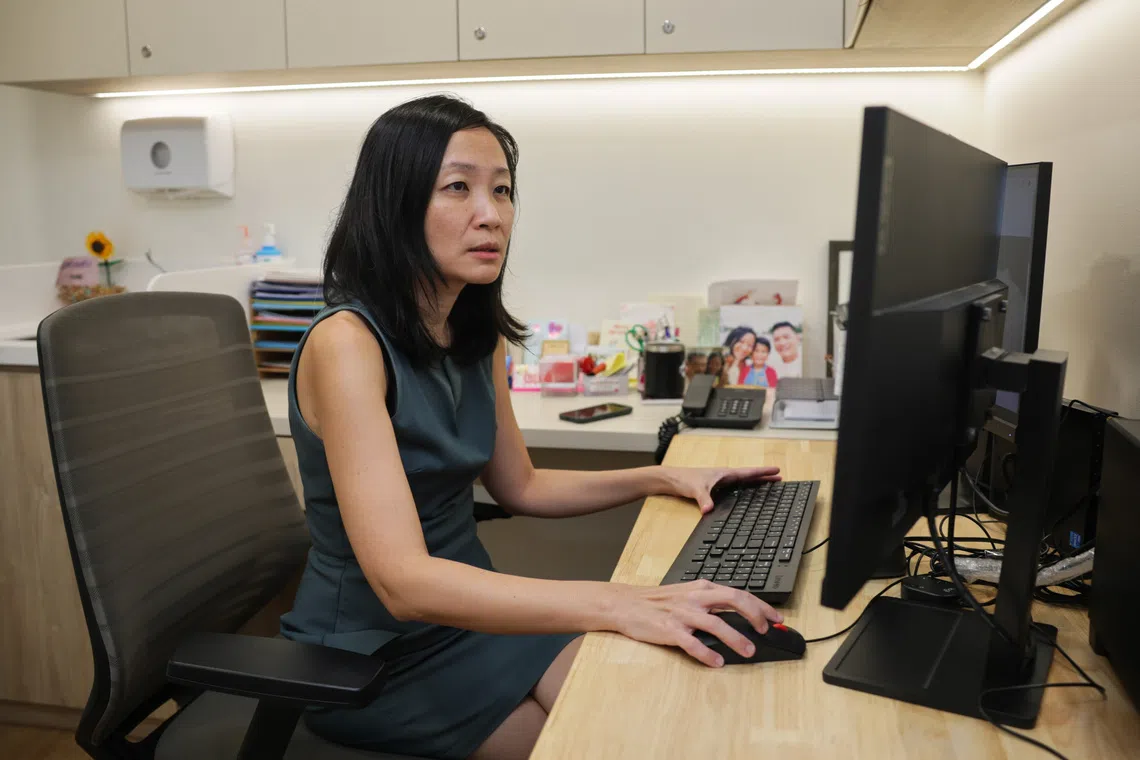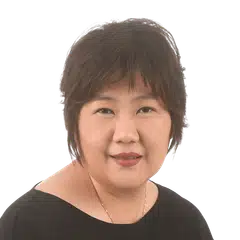Doctor left rosy career to start S’pore’s first dedicated clinic for intellectual disabilities
Sign up now: Get ST's newsletters delivered to your inbox

Dr Chen Shiling founded the Happee Hearts Movement, which has served about 500 people with intellectual disabilities since its inception.
ST PHOTO: GIN TAY
- Dr Chen Shiling founded Happee Hearts Movement, which runs Singapore's first dedicated community-based healthcare service, ID Health, for people with intellectual disabilities and their caregivers.
- She left her hospital job to address the unmet healthcare needs of individuals with ID, who often have complex, poorly addressed conditions and communication difficulties.
- ID Health plans to launch palliative, dementia and preventive care in 2026.
AI generated
SINGAPORE - For about a decade, Dr Chen Shiling, 44, felt like a lone voice in the wilderness.
Seeing a gap in how Singapore’s healthcare system diagnosed and treated people with intellectual disabilities (ID), she believed they needed care tailored to their multiple and complex needs.
But for years, she could not find the resources or support to bring her idea to life.
In 2013, she made a radical decision.
She quit her job at a public hospital, walking away from a promising training pathway towards becoming a nephrologist – a doctor specialising in treating kidney conditions – to figure out how to close that gap.
She took on part-time locum work to support her family and make ends meet, all while trying to rally interest in the dedicated healthcare service for patients with ID she envisioned.
“I had no money, no connections and no support,” she said. “All I had was an increasingly strong conviction that I had to persevere. What kept me going was seeing my patients and their families. The need is huge, and I can see the impact I can make.”
That persistence culminated in the founding of the Happee Hearts Movement, which was registered as a charity in 2022.
The charity runs IDHealth, Singapore’s first community-based dedicated healthcare service
Today, Happee Hearts has almost 30 employees, including nurses and social workers.
It has expanded to treating the caregivers of their patients with ID, recognising that unmet health needs among family members can also jeopardise the well-being of those they look after.
Since its inception, it has served about 500 people with ID and more than 1,000 of their caregivers.
It receives government grants and public donations, and offers highly subsidised fees comparable to those in public hospitals, said Dr Chen.
In 2024, IDHealth started seeing residents with ID staying in adult disability homes.
In 2026, it plans to launch three new services in palliative care, dementia care and preventive health.
In preventive health, the aim is to teach people with ID and their caregivers how to stay healthy to stave off illnesses.
A calling that began at 17
Dr Chen’s journey into this field began when she was just 17, during a volunteering stint at MINDS, a social service agency serving people with ID and their families.
She still remembers the fear she felt during her first session.
“They look, sound and behave differently, and I thought I’m not coming back,” she said. “But towards the end, a strange emotion overcame me. I felt very touched, and decided to try again for one more week.”
She ended up volunteering at MINDS every Sunday for the next six years. In those years, she grew close to many children and their families.
In 2010, while working as a doctor, she started organising health screening for people with ID as a volunteer with various social service agencies.
What she uncovered disturbed her: Many of their health problems were poorly addressed.
The problem, she said, is that patients with ID often have multiple co-existing conditions, such as anxiety, depression, epilepsy, reflux and mobility problems, but may not be able to communicate their pain or symptoms.
Instead, they may express their discomfort through shouting or agitation, which can be mistaken for behavioural problems.
Doctors may give them sedatives to calm them, but the underlying issues often go undiagnosed or untreated, she said.
This convinced her that a specialised and holistic model of care – one that looks at the patient’s mental and physical health as a whole, instead of just specific body parts – was urgently needed for people with ID.
A leap into the unknown
Almost everyone Dr Chen knew discouraged her from abandoning a stable career for an uncertain cause. She had been firmly on track to specialise in kidney medicine.
Her family’s financial background made the leap into the unknown even harder.
Dr Chen, the second of five children, said her father’s construction company collapsed when she was in medical school at the National University of Singapore.
“My pay cheques went towards helping to support my family,” she said. “We were very financially challenged, and it was not easy to make the decision to leave my job. But I felt I wouldn’t starve. I can live simply and still support my family.”
Her attempts to persuade government agencies, philanthropic groups and other organisations to set up the dedicated healthcare service for people with ID went nowhere.
“Every door shut in my face,” she said.

Seeing a gap in how Singapore’s healthcare system diagnosed and treated people with intellectual disabilities, Dr Chen Shiling believed they needed care tailored to their multiple and complex needs.
ST PHOTO: GIN TAY
Still, she received at least one call a week from MINDS and other social service agencies, asking her to see patients in their homes.
She charged families whatever they could afford – sometimes nothing at all.
“When they couldn’t afford to pay, they would give me food and drinks,” she said. “Even if I left with zero dollars, I left with a full heart, knowing I have done something for someone.”
After years of helping families one at a time, and getting doors repeatedly shut in her face, she decided she had to build the dedicated healthcare service for patients with ID herself.
So she learnt from scratch how to raise funds, run a charity, build a team and manage finances.
“Happee” is spelled with a double “e” as a playful nod to her husband’s surname – a tribute to his unwavering support throughout her journey. Dr Chen is married to fellow doctor Liam Pee, and they have a nine-year-old son.
Ms Jamila Mustaffa, 62, said Dr Chen has been treating her 95-year-old grandmother, 69-year-old uncle and 75-year-old aunt for over a decade.
All three have intellectual disabilities along with conditions such as diabetes, vision problem and mobility issues. Their primary caregiver is Ms Jamila’s 79-year-old mother.
Many caregivers like her mother struggle to keep up with the multiple medical appointments across different specialists for their loved ones and are overwhelmed by caregiving demands, said Ms Jamila.
Happee Hearts has been a lifeline for them, she said, as it provides care that is tailored to the needs of each patient and supports their caregivers.
Ms Jamila added: “Dr Chen is an exceptional doctor – highly skilled, compassionate and deeply committed to persons with intellectual disabilities and their families.
“She not only provides medical care but also takes the time to understand the emotional and mental struggles caregivers face. She builds genuine relationships with her patients. She makes them feel safe, valued and understood.”



